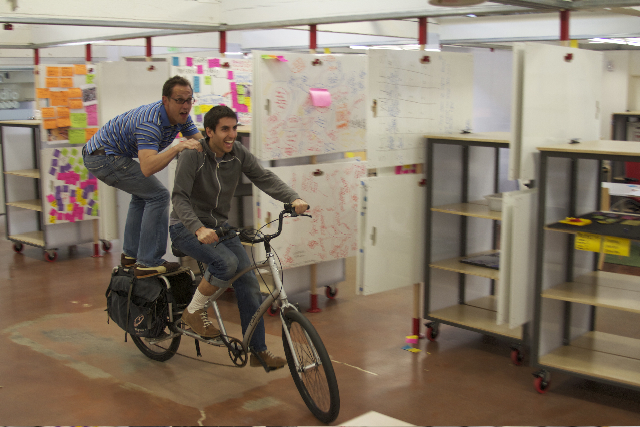 Eat less saturated fat: that has been the take-home message from the
U.S. government for the past 30 years. But while Americans have
dutifully reduced the percentage of daily calories from saturated fat
since 1970, the obesity
rate during that time has more than doubled, diabetes has tripled, and heart
disease is still the country’s biggest killer. Now a spate of new
research, including a meta-analysis of nearly two dozen studies,
suggests a reason why: investigators may have picked the wrong culprit.
Processed carbohydrates, which many Americans eat today in place of fat,
may increase the risk of obesity, diabetes and heart disease more than
fat does—a finding that has serious implications for new dietary
guidelines expected this year.
Eat less saturated fat: that has been the take-home message from the
U.S. government for the past 30 years. But while Americans have
dutifully reduced the percentage of daily calories from saturated fat
since 1970, the obesity
rate during that time has more than doubled, diabetes has tripled, and heart
disease is still the country’s biggest killer. Now a spate of new
research, including a meta-analysis of nearly two dozen studies,
suggests a reason why: investigators may have picked the wrong culprit.
Processed carbohydrates, which many Americans eat today in place of fat,
may increase the risk of obesity, diabetes and heart disease more than
fat does—a finding that has serious implications for new dietary
guidelines expected this year.
In March the American Journal of Clinical Nutrition published a meta-analysis—which combines data from several studies—that compared the reported daily food intake of nearly 350,000 people against their risk of developing cardiovascular disease over a period of five to 23 years. The analysis, overseen by Ronald M. Krauss, director of atherosclerosis research at the Children’s Hospital Oakland Research Institute, found no association between the amount of saturated fat consumed and the risk of heart disease.


 In the emerging
In the emerging  A few years ago North Dakota erected some clever signs at its border with Montana. One sign advised anyone headed west to remember what happened to a certain long haired cavalry commander who left North Dakota in 1876 and ended up in a sorry state on the banks of the Little Big Horn in Montana.
A few years ago North Dakota erected some clever signs at its border with Montana. One sign advised anyone headed west to remember what happened to a certain long haired cavalry commander who left North Dakota in 1876 and ended up in a sorry state on the banks of the Little Big Horn in Montana.
 NEW YORK (CNNMoney.com) -- To motivate the well-off to funnel more of their cash into small businesses, should the federal government offer investors new tax breaks?
NEW YORK (CNNMoney.com) -- To motivate the well-off to funnel more of their cash into small businesses, should the federal government offer investors new tax breaks? Dropbox is a "hard drive in the clouds," says the hot Silicon Valley startup's very humble founder and CEO, an MIT grad named Drew Houston.
Dropbox is a "hard drive in the clouds," says the hot Silicon Valley startup's very humble founder and CEO, an MIT grad named Drew Houston.
 The expansion, which is being spearheaded by IBM sub-Saharan Africa GM Oliver Fortuin (pictured) and his colleague, long-time IBMer Gary Carroll, forms part of a renewed focus on emerging markets by the US-headquartered technology and services company.
The expansion, which is being spearheaded by IBM sub-Saharan Africa GM Oliver Fortuin (pictured) and his colleague, long-time IBMer Gary Carroll, forms part of a renewed focus on emerging markets by the US-headquartered technology and services company.

 Zhou Libo's show at the cavernous Shanghai International Gymnastics Center has been sold out for days, and after I finally get a ticket, I understand why. Sporting a tuxedo and a white bow tie, Zhou, 43, a stand-up comedian, delivers rapid-fire jokes, mostly about life in Shanghai. The theme is "I'm crazy about money," and Zhou riffs on soaring property prices, how much it costs to raise kids, even how much the U.S. owes China. The audience of some 3,700 roars its approval. People are clapping, slapping their thighs, stomping the floor. I manage a smile, but even though I am a Mandarin speaker, I don't really get the humor, and many of my Chinese friends would be almost as lost. While Zhou sets up his jokes in Mandarin, the punch lines are nearly always in the local Shanghai dialect. This much I do get, however: the performance is an unabashed celebration of all things Shanghai and Shanghainese.
Zhou Libo's show at the cavernous Shanghai International Gymnastics Center has been sold out for days, and after I finally get a ticket, I understand why. Sporting a tuxedo and a white bow tie, Zhou, 43, a stand-up comedian, delivers rapid-fire jokes, mostly about life in Shanghai. The theme is "I'm crazy about money," and Zhou riffs on soaring property prices, how much it costs to raise kids, even how much the U.S. owes China. The audience of some 3,700 roars its approval. People are clapping, slapping their thighs, stomping the floor. I manage a smile, but even though I am a Mandarin speaker, I don't really get the humor, and many of my Chinese friends would be almost as lost. While Zhou sets up his jokes in Mandarin, the punch lines are nearly always in the local Shanghai dialect. This much I do get, however: the performance is an unabashed celebration of all things Shanghai and Shanghainese. Regular, petroleum-based plastic doesn't biodegrade. But this year's crop of Earth Day — inspired ads shows plant-based plastics doing just that: an empty SunChips bag fading into the soil, a Paper Mate pen dissolving underground. Although the visuals suggest that these items simply disintegrate (Goodbye, landfill!), the reality is more complicated. Take the SunChips bag. It needs to go in a compost bin; the packaging is clear about that. Likewise, Paper Mate notes that the pen's outer casing will break down if buried in a backyard but that its innards should go in the garbage. Forget to separate them, and the outer part won't biodegrade in a landfill.
Regular, petroleum-based plastic doesn't biodegrade. But this year's crop of Earth Day — inspired ads shows plant-based plastics doing just that: an empty SunChips bag fading into the soil, a Paper Mate pen dissolving underground. Although the visuals suggest that these items simply disintegrate (Goodbye, landfill!), the reality is more complicated. Take the SunChips bag. It needs to go in a compost bin; the packaging is clear about that. Likewise, Paper Mate notes that the pen's outer casing will break down if buried in a backyard but that its innards should go in the garbage. Forget to separate them, and the outer part won't biodegrade in a landfill.

 If you
If you 







